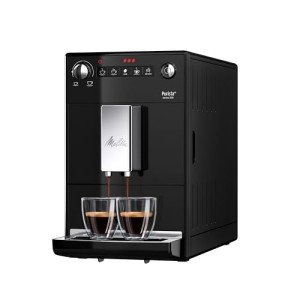Energy-Efficient Espresso Machines: A Comprehensive Guide
In the world of coffee lovers, espresso machines are often considered as vital home appliances for brewing rich, aromatic coffee. Nevertheless, Buy Coffee Maker connected with these machines can cause increased utility bills and environmental issues. As customers become more eco-conscious, energy-efficient espresso machines have become a popular choice. This post intends to check out the features, benefits, and options offered in energy-efficient espresso machines, assisting coffee enthusiasts make notified choices.
What Makes an Espresso Machine Energy-Efficient?
Energy-efficient espresso machines are created to lessen energy intake while keeping optimum efficiency. A number of features contribute to the energy efficiency of these machines:
- Insulation: High-quality insulation helps retain heat, decreasing the energy needed to preserve ideal brewing temperatures.
- Smart Technology: Many modern machines are geared up with programmable settings that allow users to schedule developing times and switch to standby mode when not in use.
- Quick Heat-up Time: Energy-efficient espresso machines typically use sophisticated heating innovations, such as thermoblocks or PID controllers, to heat water rapidly.
- Low Wattage: Machines that operate at lower wattages take in less energy overall, making them more effective.
- Vehicle Shut-off: Automatic shut-off features ensure that the machine turns off after a particular period of lack of exercise, more lowering energy waste.
Benefits of Energy-Efficient Espresso Machines
Buying an energy-efficient espresso machine can offer a number of benefits:
- Cost Savings: Over time, lower energy consumption can cause decreased electricity bills.
- Environmental Impact: Using less energy minimizes carbon footprints, making these machines a more sustainable option for environmentally mindful consumers.
- Improved Performance: Many energy-efficient models likewise offer superior brewing technologies, leading to better-tasting espresso.
- Toughness: Typically, energy-efficient machines are developed with high-quality parts, leading to higher longevity.
Features to Consider
When picking an energy-efficient espresso machine, a number of features should be taken into consideration:
- Type of Machine: Options include manual, semi-automatic, and completely automatic designs, each with varying degrees of user control and automation.
- Brew Quality: Look for machines that utilize high-quality developing systems to ensure optimum taste extraction.
- Maintenance: Some machines have self-cleaning functions that can save energy and effort in maintenance.
- Capacity: Depending on individual or family size, machine capability can impact energy intake, with larger machines often requiring more power.
Popular Energy-Efficient Espresso Machines
The marketplace offers a range of energy-efficient espresso machines catering to different needs and preferences. Below are some noteworthy designs:
| Brand | Design | Key Features | Energy Consumption |
|---|---|---|---|
| Breville | Barista Express | Integrated grinder, PID temperature level control, fast heat-up. | Low |
| DeLonghi | EC155 | Compact size, simple to use, long lasting build. | Moderate |
| Rancilio | Silvia | Heavy-duty style, excellent temperature stability, and has a low environmental impact. | Moderate |
| Gaggia | Classic | Trusted manual operation, resilient brass parts, and effective steaming capability. | Low |
| Jura | E8 | Totally automatic, wise features, and a removable brew group for easy cleansing. | Low |
Tips for Optimal Energy Efficiency
Aside from choosing an energy-efficient design, customers can embrace several practices to make the most of energy performance:
- Preheat: If your machine has a pre-heating function, use it to make sure that the optimal temperature is reached quickly before developing.
- Shut off After Use: Always switch off the machine after brewing or use machines with vehicle shut-off functions.
- Routine Maintenance: Keep the machine properly maintained to guarantee it runs efficiently and successfully.
Frequently Asked Questions About Energy-Efficient Espresso Machines
1. Are energy-efficient espresso machines more costly?
While the initial investment may be greater for energy-efficient models, the long-lasting savings on electricity bills can offset the initial cost. In addition, lots of energy-efficient machines featured innovative features that enhance the developing experience.
2. How do I understand if an espresso machine is energy-efficient?
Look for indications such as Energy Star accreditation, user reviews, and requirements concerning wattage and heat-up time. Machines with particular functions targeted at decreasing energy usage are typically created for better effectiveness.
3. Can Espresso Machines Under £200 use an energy-efficient espresso machine for other coffee styles?
Many energy-efficient espresso machines use flexibility, allowing users to brew various coffee designs beyond espresso, such as lattes and cappuccinos, by including steaming abilities.
4. Do Espresso Machine Deals -efficient designs sacrifice quality for efficiency?
Not necessarily. Numerous energy-efficient espresso machines are geared up with high-quality developing innovation that can enhance taste extraction while reducing energy intake.
5. What upkeep is required for energy-efficient espresso machines?
Routine maintenance includes cleaning the machine, descaling when required, and regularly inspecting seals and gaskets to ensure optimal efficiency and energy performance.
Energy-efficient espresso machines represent a best blend of performance, cost savings, and environmental duty. By thinking about numerous features, benefits, and brand names, consumers can pick a design that fits their unique preferences while contributing favorably to the environment. As the trend towards sustainable living grows, the popularity of energy-efficient appliances, including espresso machines, is likely to continue its upward trajectory, using coffee enthusiasts a guilt-free method to enjoy their daily dose of espresso.

